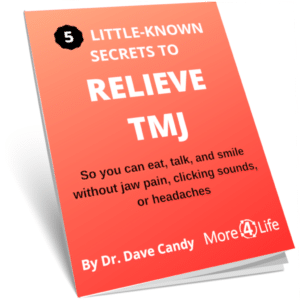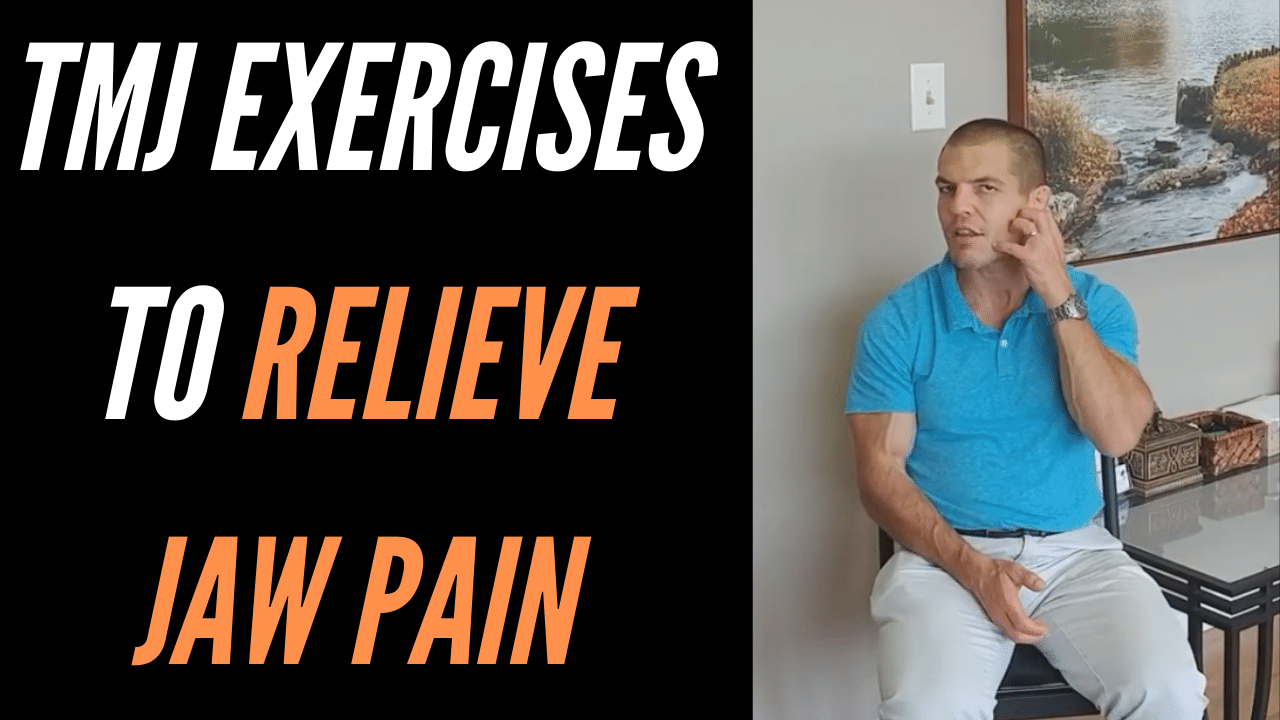Looking For TMJ Exercises To Stop Jaw Popping, Clicking, & Pain?
Watch the video to learn easy TMJ exercises to relieve jaw pain and stop popping and clicking.

Do TMJ Exercises Relieve Jaw Pain?
TMJ exercise can give temporary relief from jaw pain, but they usually don't fix the problem permanently.
Why is that?
TMJ disorder is a behavioral problem. It often has deep roots in terms of stress, jaw clenching, and other habits that you don't realize you're doing.
Additionally, poor postural habits are another leading cause of TMJ.
So do TMJ exercises fix those behavioral habits?
No.
However, sometimes you just need some quick pain relief, and TMJ exercises can help do that.
What Are The Best TMJ Exercises To Relieve Jaw Pain?
If you Google "best TMJ exercises to relieve jaw pain" you'll probably find some very general exercises like these:
-
Opening and closing your mouth
-
Moving your jaw side to side
-
Isometric strengthening exercises for your jaw muscles.
-
Tucking your chin
-
Putting your tongue to the roof of your mouth.
Now, many of these are good exercises, especially the last two.
But not everyone with TMJ needs to to ALL of these exercises.
In fact, most people with TMJ shouldn't do ALL of these exercises.
Why?
Because TMJ, or more properly TMD (temporomandibular joint disorder), is not a single type of disorder.
Some forms of TMD are primarily joint disorders, some are disc displacement disorders (especially if you have jaw popping or clicking), and some forms of TMD are muscular disorders.
There are different exercises that are good for each different type of TMJ disorder.
The most common cause of jaw pain is muscle tension
This means that most people with TMJ disorders have jaw muscles that are in spasm and are actually too strong. Therefore, very few people actually need TMJ strengthening exercises.
Finally, IF you need to do side to side exercises, most people don't need to go both ways.
It will usually be easier to move your jaw to either the right or left, and harder to go the opposite way.
If this is the case, ONLY do the direction that is difficult.
What TMJ Exercises Can Stop Jaw Popping & Clicking?
TMJ popping and clicking is usually caused by an articular disc displacement in the tempomandibular joint (jaw joint).
The TMJ is a ball and socket joint. As you can see in the picture above, normally the articular disc in the temporomandibular joint should be in line with the "ball" of the lower jaw bone, labeled "Mandibular condyle" in the picture above.
If the articular disc starts getting in front of or behind the mandibular condyle, it can cause jaw clicking, popping, or even locking - where your mouth gets stuck open or closed.
- Open lock - disc stuck behind mandibular condyle and you can't close your mouth
- Closed lock - disc stuck in front of mandibular condyle and you can't open your mouth
Now, there's a muscle called the lateral pterygoid that attaches to both the articular disc and mandibular condyle.
The lateral pterygoid muscle controls the way the articular disc and mandibular condyle move when opening and closing your mouth.
Therefore, you can do exercises to train this muscle and stop jaw popping and clicking.
Largely, the best exercise to learn to stop your jaw from clicking and popping is to put your tongue behind your top teeth and practice opening and closing your mouth while keeping your jaw midline.
This last part is VERY important. See the video above to learn how to do this better.
You can open and close your mouth in front of a mirror to make sure it's staying midline. You can also use your own fingers to feel for the movement of the jaw joints to make sure they're moving evenly.
However, sometimes it's difficult to keep your jaw from moving to one side when opening your mouth, especially if your jaw regularly clicks or pops.
This is usually due to muscle imbalances where the jaw muscles on one side of the jaw get too stiff, and so the other side opens more to make up for it. The side that opens more is usually the side where you will have jaw clicking and popping.
Fortunately, you can also do exercises to improve the side-to-side muscle imbalances in your neck and jaw muscles.
Try This Unique Exercise To Stop Jaw Popping, Clicking, and Pain On One Side Of The Jaw
TMJ Exercise To Stop Jaw Pain, Popping, & Clicking On One Side Of The Jaw
-
Stand in front of a mirror with your eyes closed.
-
Open your eyes and see where your head is naturally.
-
If it is tipped over to one side, you're going to stretch to the opposite side.
-
Put your hand on top of your head and press downward on your head.
-
Tip slightly away from the side that you normally tip while still pushing down on your head.
-
With your opposite hand push your jaw slightly to the same direction that you're tipping your head.
Want More Useful Tips To Relieve Jaw Pain?
Download our FREE Guide called "5 Little Known Secrets To Relieve TMJ"

What Else Can I Do Do Relieve TMJ?
As mentioned above, exercises are usually NOT the best way to relieve TMJ in the long-term.
Many of the causes of TMJ are habitual behaviors, most that you don't even realize that you're doing.
Here are some other tips that you can use to relieve TMJ
-
Posture - sitting upright with your head over your shoulders reduces the tension on your neck muscles. This in turn puts your jaw in a position to function optimally.
-
Tongue to roof of mouth - this was mentioned above as an exercise to relieve jaw pain, but the exercise is really only meant to facilitate a habit. The more often you can keep your tongue behind your top teeth throughout the day, the less likely you are to clench your teeth.
-
Don't open your mouth too wide - If you limit mouth opening to only what you can do with your tongue behind your top teeth, it makes it difficult to open too far. Opening too far is one of the primary causes of jaw clicking and popping.
-
Breath from your diaphragm - This is a great way to relieve stress, which reduces the muscle tension in your neck and your jaw. It makes you less likely to clench your teeth. It also prevents you from using your neck muscles to breath since your neck muscles are accessory
-
Keep your jaw midline at when opening and closing your mouth.
Need Some Help For TMJ?
Call us at 314-941-3970 or tap the button below to call now
After hours? Click here to Request A Call From A TMJ Specialist




